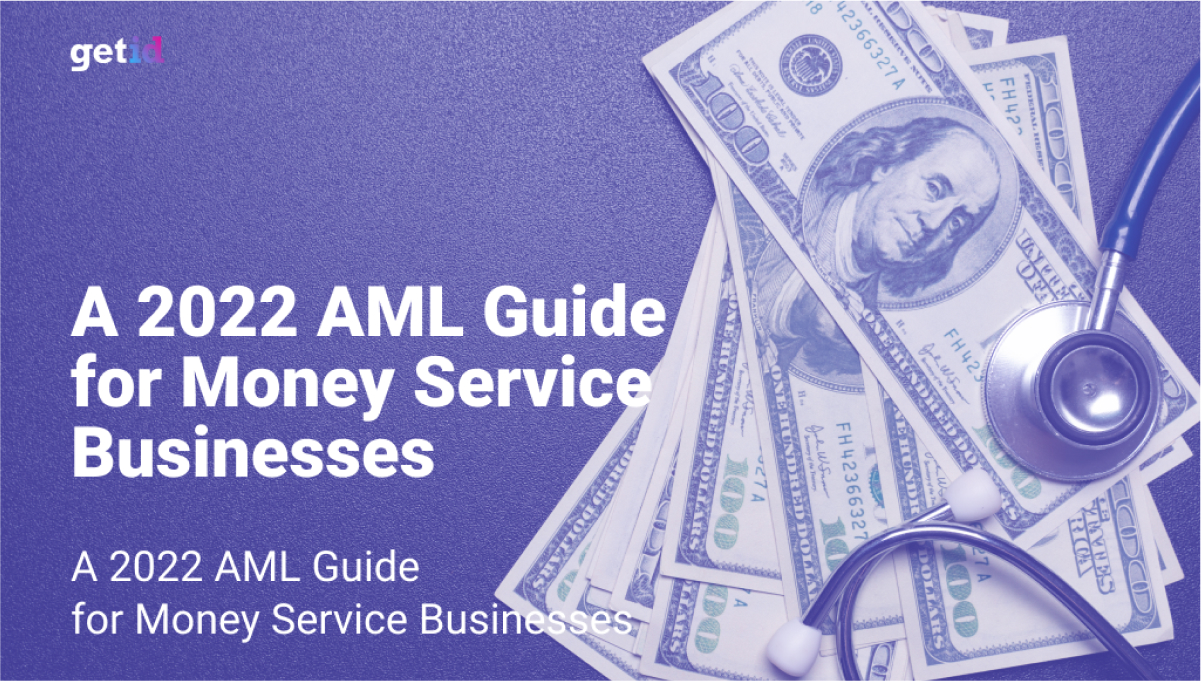
Keeping Up with the Compliances – A 2023 AML Guide for Money Service Businesses
21 Jan 2022
Introduction
In a globalized world, money laundering has become a worldwide pandemic. Financial crime has swept through banks and financial institutions, putting companies at risk.
Money service businesses or MSBs appear to be the new vehicle for criminal rings to move money across borders and within countries. Regulations are tightening to ensure that MSBs are doing everything in their power to prevent crimes.
While MSBs have no inclination to indulge in criminal activity, full AML compliance poses its own challenges. Expensive compliance staff and friction during onboarding are only compounded by the error-riddled process of manual customer identification and verification.
Non-compliance is not an option and threatens MSBs with non-compliance fines and serious reputational damage.
An affordable, accessible solution is needed to ensure that MSBs are staying compliant. One that ensures AML regulation, now and into the future. Thankfully, GetID’s omnichannel identity verification platform offers an ideal solution.
Using a multifaceted architecture of automatic verification solutions, GetID ensures complete AML compliance in minutes. For MSBs, this means frictionless onboarding and cost-effective KYC. What more do you need?
What is a Money Service Business?
A money service business (MSB) refers to a company or person that deals in the transmission and conversion of money. ‘Money service business’ is a term that is used to distinguish money transmission and exchange companies or people from fully-fledged banks.
Responsible for more than $1 trillion in annual transactions in the USA, the Inland Revenue Service (IRS) distinguishes between money transmission and money conversion MSBs. Conversion MSBs are companies that cash checks, exchange foreign currency, sell prepaid or stored value products, and so on. These types of firms are classed as MSBs if their services convert more than $1000 per person per day, across one or more transactions. However, money transmission firms or people are regarded as MSBs, no matter the amount involved.
Which Businesses Count as MSBs?
MSBs are not banks. They can include companies that work in e-commerce, cryptocurrency, crowdfunding, travel money, etc. FinCEN has outlined the types of businesses included under the MSB umbrella.
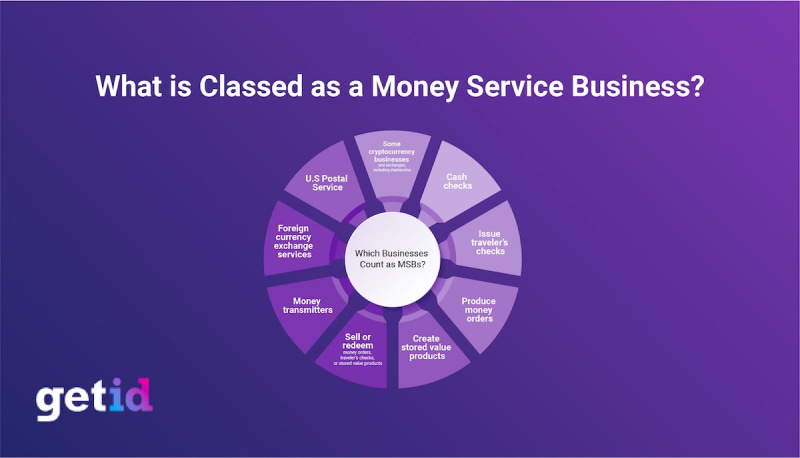
These are companies that:
- Cash checks
- Issue traveler’s checks
- Produce money orders
- Create stored value products
- Sell or redeem money orders, traveler’s checks, or stored value products
- Money transmitters
- Foreign currency exchange services
- U.S Postal Service
- Some cryptocurrency businesses and exchanges, including stablecoins.
What Doesn’t Count as an MSB?
According to FinCEN, banks (as defined in 31 CFR 1010.100(d)) are not included as they are subject to their own regulations. Equally, a person or body registered and regulated by the Commodity Futures Trading Commission or the Securities Exchange Commission is also exempt.
The Rise of MSBs
The internet has changed the way people use money and banking services around the world. The demand for worldwide money exchange services has increased the prevalence of the MSB sector.
There are nearly 25,000 MSBs registered in the US today, and it’s increasing.
The term ‘money service business’ used to refer to check cashing companies like Moneytree or ChecknGo. People could cash checks via these companies without a bank account.
As the labor market has evolved, so too have the money service businesses that serve it. The gig economy is where this is seen a lot. Companies like PayPal, Rimuut, Toggle, and Stripe all facilitate the transfer of funds to pay outsourced staff anywhere in the world.
Money can be transferred to different currencies via platforms like Transferwise and Western Union.
Travel money services are also in high demand. Foreign exchange services that offer worldwide cash currency and prepaid travel cards from Caxton and Revolut bring traveling into the 21st century.
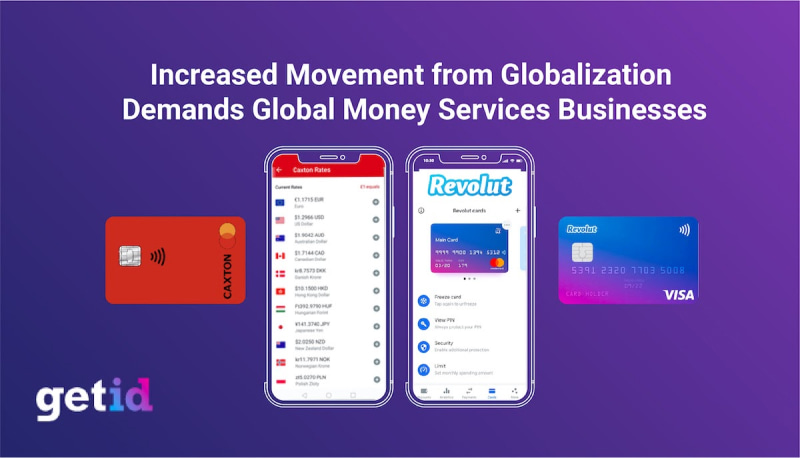
Loans and p2p funding are another area. As consumer debt rises and the cost of living balloons, payday loan companies like Wonga and Drafty are increasingly popular.
Peer-to-peer lending platforms RateSetter and LendingClub enable individuals to support others. Companies like IndieGoGo and GoFundMe act as the go-between to support projects.
Regulatory bodies have started to crack down on cryptocurrency and crypto-related businesses (such as exchanges). These entities are now becoming recognized as MSBs. Virtual currencies are being taken on by MSBs, not banks.
Many services are popping to meet the needs of the 2 billion people that do not have a bank. Money service businesses tend to offer more flexible services than traditional banks – and are quicker to adapt to change.
AML and KYC Requirements for MSBs
The legal requirements for MSBs relate directly to the country the company is registered. While there are some variations, the general consensus is the same — MSBs are subject to anti-money laundering (AML) regulations and must have stringent AML policies in place.
In the USA, MSBs are subject to the Banking Secrecy Act and must register with FinCEN. This is not a lifelong registration, MSBs though must renew this registration every two years.
In the UK, MSBs must register to become an AML-supervised business with HMRC. MSBs classed as money transmission businesses must also follow the Payments Regulation 2015 and the Payment Services Regulations 2017. They state that information must be reported in regards to fund transfers.
When it comes to AML requirements, both the UK and the USA have pretty similar rules for MSBs. As sums of money are being moved within these companies, keeping money laundering at bay is extremely important. This is particularly important for MSBs that deal with international money exchanges, as these are particularly vulnerable to criminal activity.
AML regulations require MSBs to develop and implement an AML compliance program. Part of this means ensuring that MSBs have processes in place to identify and verify customers and their relevant data (known as ‘Know Your Customer’ or KYC).
These AML policies need to contain procedures that identify and flag potentially suspicious behavior, along with processes for reporting this activity to the relevant bodies. MSBs must also report high-value cash transactions of over $10,000 (in the US) or 10,000 EUR (in Europe).
Under the Banking Secrecy Act in the USA, MSBs must appoint a person or team to deal with AML compliance to ensure policies are being carried out effectively. The MSB must provide AML training to all MSB compliance staff and relevant workers.
Firms must present themselves for independent audits to demonstrate AML compliance. In terms of record-keeping, MSBs must keep records in an easy-to-retrieve format in case of an audit. Some types of records need to be held on file for up to five years.
The Role of KYC in MSB AML Compliance
Know Your Customer (KYC) is an integral part of AML compliance. This procedure involves the identification and authentication of customers during the MSB customer onboarding process. By checking that customers are who they say they are, MSBs can reduce levels of fraud and criminal activity at the entry-point.
Outlined by FinCEN, KYC processes identify risky customers in the onboarding process as well as suspicious transactions. Personal Identifiable Information (PII) is gathered from a customer, including full name, date of birth, and an address. MSBs also need to collect official documents, such as a passport or driver’s license.
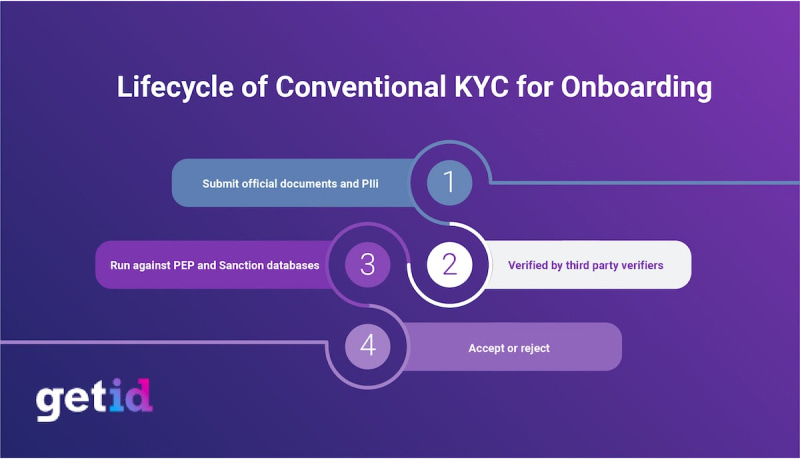
Once verified, their information is run against official databases that highlight Politically Exposed Persons (PEPs) and anyone on the Sanctions list. This will flag customers who have the capacity or means for money laundering, terror funding, or other criminal activity.
Traditionally, the verification process is done manually by third-party verifiers. This means it is slow, expensive, and peppered with errors. As technology moves forward, solutions like GetID help automate this process to speed up verification and ensure rock-solid accuracy in MSB KYC.
Although MSBs are differentiated from banks, KYC requirements are similar as a means of customer due diligence (CDD). The main difference is that banks are more likely to complete enhanced due diligence (EDD) because of the higher value of transactions that occur.
EDD is a more stringent verification procedure than KYC or regular CDD. That said, if an MSB completes high-value transactions or works risky customers, they too will need to complete EDD procedures.
Why is AML Compliance So Important for MSBs?
It’s no secret that MSB AML compliance is an expensive part of doing business. While MSBs may feel burdened by the burgeoning AML responsibilities, compliance protects these firms from financial crimes, non-compliance fines, and reputational damage.
MSB AML Compliance is a Barrier to Financial Crime
Non-compliance with AML regulations leaves MSBs vulnerable to financial crimes. Though AML standards seem strict, these rules are in place to stamp out financial crimes as quickly as possible.
Take a look at Western Union, one of the most famous MSBs in the world. They were fined $600 million for poor AML compliance. Western Union became a prime target for criminal money transactions and staff members helped the process. One in China had helped illegal immigrants and human traffickers structure payments in a way to not trigger Bank Secrecy Act reporting requirements.
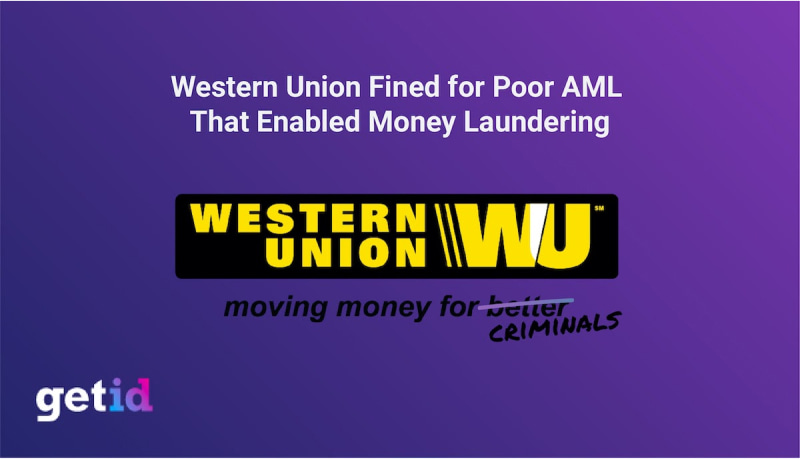
London police fear that MSBs are preferred by criminals because of their propensity to deal in cash. The Metropolitan Police found that MSBs are linked to drug trafficking rings, as opposed to banks which have more stringent regulations. The network of 35,000 MSBs in the UK helps criminals easily launder small amounts of money and go largely unnoticed.
MSBs can protect themselves against criminal activity by implementing AML policies. Ones that flag suspicious transactions and identify shady characters. And with tight onboarding procedures and ongoing monitoring in place.
MSB AML Non-Compliance Can Result in Company-Crumbling Fines
Accounting for 5% of the global GDP or around $2 trillion, money laundering is a worldwide epidemic. This is why regulatory bodies are so eager to stem the cross-border flow of criminal funds. Not only does money laundering incite crime, but it also affects global economies as large amounts of money wash in and out of countries.
This is why regulatory authorities are cracking down and shelling out huge fines for AML non-compliance. These fines have the potential to bring businesses to their knees.
Touma Foreign Exchange Ltd was recently slapped with an unprecedented AML non-compliance fine by the HMRC in the UK. After failing to install sufficient AML controls and policies, the HMRC doled out a 10.1 million pound fine. HMRC identified shortcomings in ‘fundamental’ customer due diligence controls, staff training, and financial risk assessments. They were forced to shut down as a result of this sky-high fine.
Ignoring AML regulations is no longer an option. With such significant clampdowns on money services firms, non-compliance is likely to result in fines that will put MSBs out of business.
MSB AML Compliance Protects Company Reputation
When firms are identified as falling short on AML, it scares customers into believing that these companies aren’t safeguarding their clients. The result? Fewer customers and reduced profits.
The prospect of criminal activity and fraud in an MSB not only worries customers but also shakes investor confidence. This was seen when PayPal’s AML policy information was subpoenaed due to suspicion that the company’s procedures were not up to scratch. Almost immediately, share prices fell by 1.5%.
There was also an AML scandal with Danske. The Danish bank lost 18,500 customers and an annual profit drop of around $12 billion.
Protection against financial criminality is not only important to authorities but also to the clients within MSBs. When it comes to money services, customers want to feel secure that their funds are safe. If not, customers simply take their business elsewhere.
The AML Compliance Pain Points for MSBs
While AML compliance is essential, it isn’t always easy for MSBs. Tighter MSB regulations mean increased costs and longer onboarding times. This can lead to higher customer drop-off rates. Not only that, but manual verification procedures are often error-prone.
Strict KYC/AML Creates Friction in MSB Customer Onboarding
KYC procedures are a significant part of AML compliance, but they can often take a long time. Many MSBs put KYC processes on the backburner in favor of smoother onboarding.
While MSBs try to provide a sleeker, more lightweight version of banking, the slow pace can seriously affect customer retention rates. Statistics show that 48% of MSBs felt that KYC and AML compliance is a barrier to innovation.
Studies show that 25% of customers drop out of the financial services they applied to. This figure has increased by 35% in the last two years. This is a considerable loss of potential customers, showing the need for better procedures.
Regulations have tightened, but there is still a lack of standardization for KYC and AML procedures. External third-party verification mechanisms aren’t transferable between companies, and this, in turn, creates friction.
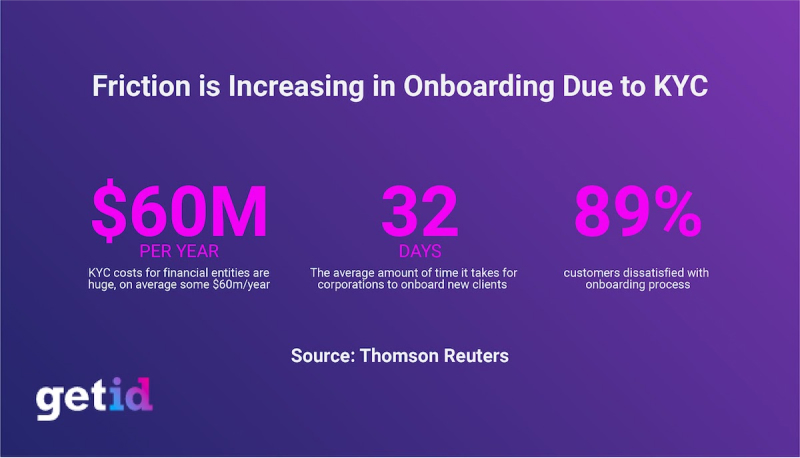
To streamline this process, MSBs need to break away from cumbersome, error-prone, manual KYC processes, and invest in a new solution. GetID’s automated KYC procedures decrease onboarding time and, in turn, diminish customer drop-out rates.
The Cost of MSB AML Compliance is Rising
In response to heightened regulations, MSBs need to put more rigorous AML processes in place. The problem is, these compliance programs cost a lot.
As AML regulations increase, MSBs need to shell out money to hire and train compliance staff, who, due to their short supply, can command high salaries. On top of this, more rigorous KYC procedures mean amplified spending on external verification and remedying errors caused by manual processing.
Take Revolut, for example. Following a recent compliance scare, they increased their compliance team by a third. Global compliance spending sits close to $270 billion, with about 10 to 15 percent of the MSB workforce dedicated to ensuring regulatory compliance.
The cost of compliance shows no signs of slowing down. For smaller companies and startups, these costs will continue to impact profit margins and the ability to scale.
Instead of employing armies of compliance staff, a digital KYC solution is a great alternative. GetID’s automated KYC solution offers customer verification in minutes, without the high cost.
Manual Processing is Highly Error-Prone
There is no standardized procedure for KYC verification processes. Manual processes involve third-party verifiers checking applicants against databases and official documents by hand. The constant yo-yo-ing of PII and client applications gives rise to a multitude of opportunities for error.
While the banking industry has started to implement more standardized procedures, the vulnerability of the KYC process is heightened with MSBs and their unique needs.
Future KYC solutions need to tackle the shortcomings of manual systems. By eliminating human error and standardizing KYC processes with a digital, automated tool, GetID resolves these weaknesses.
How Can GetID Ease AML Friction for MSBs?
GetID’s automatic verification platform enables faster, fully-compliant onboarding. Our KYC solution works by using automated identification and verification tools to ensure accurate authentication in minutes.
Optical Character Recognition, Face Match software, and Liveness Detection technology makes it easy to identify a client and verify their identity. Our solution runs each client against official PEP/Sanctions databases to immediately identify potential red flags.
With GetID’s fully-compliant KYC solution, MSBs can benefit from lightning-fast onboarding, making customer drop-out rates a thing of the past. By significantly reducing the friction in onboarding, customers can be up and running in minutes.
The automatic nature of our system ensures higher accuracy than shabby manual KYC processes. This speeds up onboarding and cuts back remedial costs.
With GetID’s omnichannel solution, identification and verification are no longer manual tasks. This means more money to use on scaling your business.
Most importantly, GetID is a one-stop-shop for AML compliance. Our solution ensures that MSBs adhere to all current AML regulations and are future-proofed against the increasing regulations of tomorrow. By keeping ahead of AML compliance with GetID, MSBs no longer need to fret about financial crime, non-compliance fines, or reputational damage.
Conclusion
Money service businesses need to stay compliant. While banks are moving toward stricter standardization, there is still hesitation among MSBs to fully embrace the standards needed for today’s level of compliance. Despite MSBs dragging their heels, regulatory bodies continue to slam these businesses with huge fines.
Because of this, it is vital that MSBs find an affordable KYC and AML solution that addresses the steep customer drop-out rates without breaking the budget. Although MSBs are feeling the full force of costly verification procedures and staffing, slow onboarding, and poor KYC accuracy, AML compliance is a must.
GetID has the ideal solution for MSBs to tackle AML compliance. Our automated omnichannel platform enables MSBs to verify their customers’ identities, which streamlines the KYC process by cutting out costly compliance teams and third-party verifiers.
This takes a fraction of the time in comparison to traditional KYC processes. GetID’s solution is not only more accurate, but it’s also more cost-effective. Best of all, GetID’s solution is designed to meet all regulatory requirements now and into the future.
On the hunt for a KYC solution to ensure full compliance for your MSB? Look no further – head to GetID.com today to find out about frictionless KYC, while guaranteeing full AML compliance.